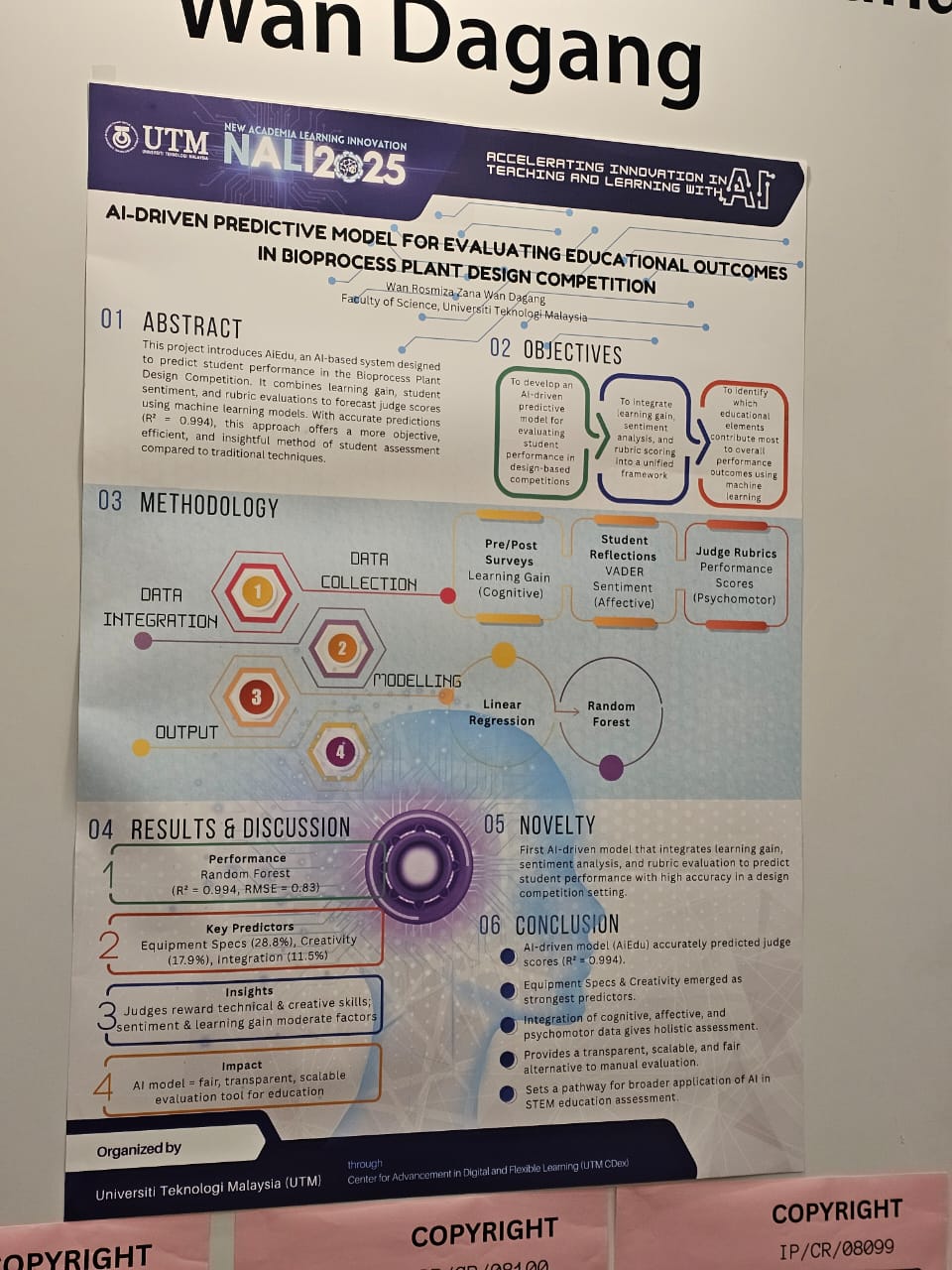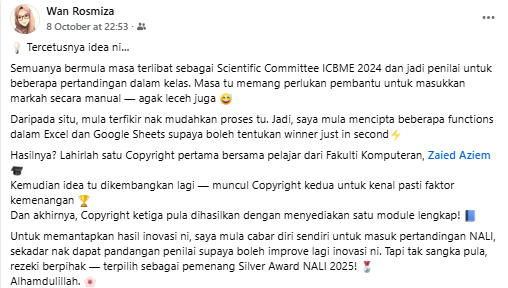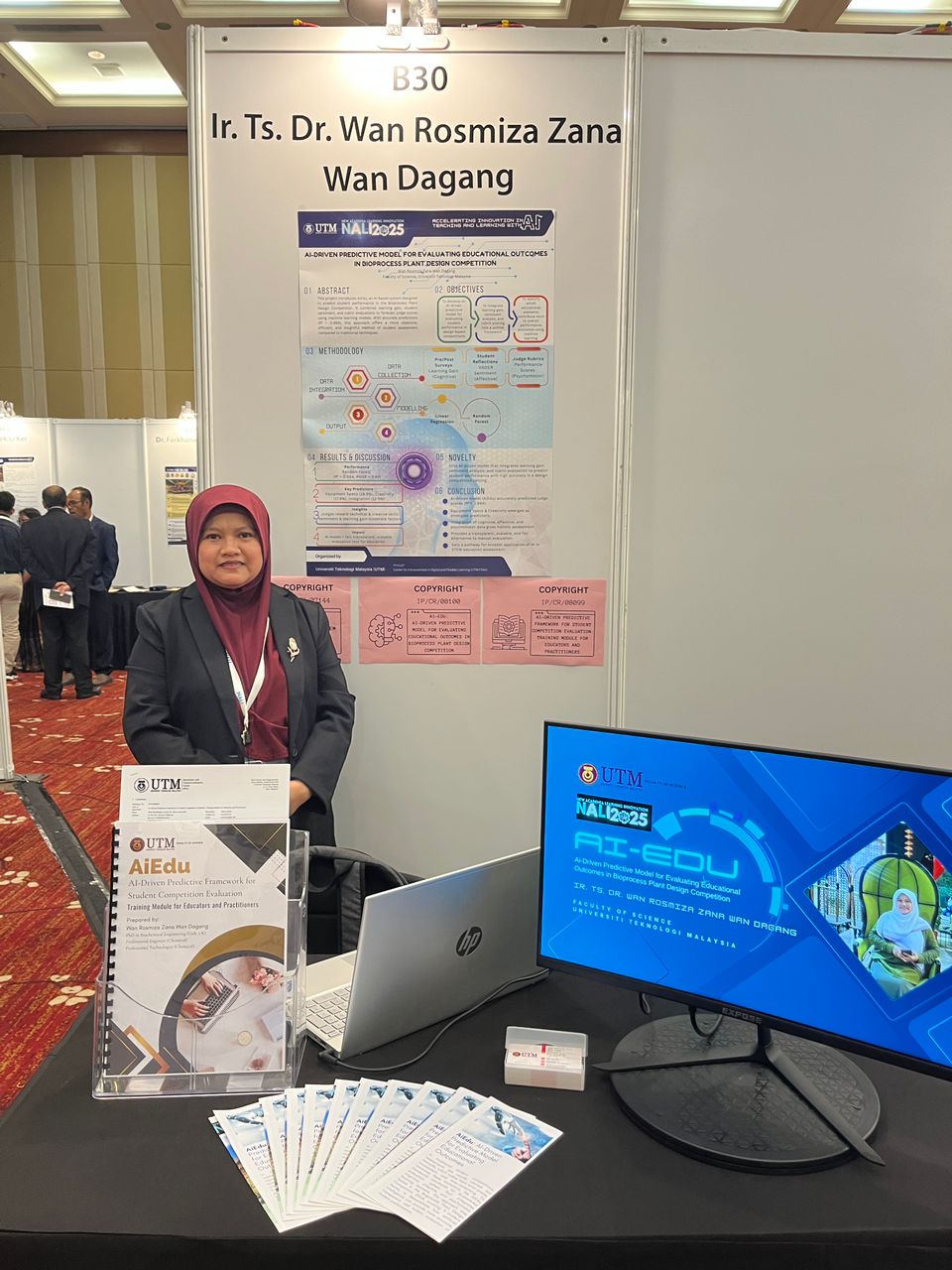The Faculty of Science, Universiti Teknologi Malaysia (UTM) continues to lead innovation in digital education with the development of AiEdu, an artificial intelligence (AI) framework designed to evaluate student performance in engineering education through data-driven, transparent, and scalable methods
Developed by Dr. Wan Rosmiza Zana Wan Dagang from the Department of Biosciences, AiEdu integrates cognitive, affective, and psychomotor dimensions of learning to provide a holistic and evidence-based assessment approach. This innovative model was implemented during the Bioprocess Plant Design Competition 2024, where 11 student teams demonstrated their engineering creativity through process flow designs and functional prototypes.
A New Era of Smart Assessment
Traditional competition assessments often rely on manual scoring, which can be subjective, inconsistent, and time-consuming. AiEdu addresses these challenges by incorporating machine learning into the evaluation process.
The framework captures and analyzes three dimensions of student performance:
- Cognitive – measured through learning gains from pre- and post-event surveys.
- Affective – assessed using the VADER sentiment analysis tool, which quantifies students’ emotions and reflections during the competition.
- Psychomotor – evaluated through detailed rubrics focusing on creativity, technical accuracy, and equipment integration
Using these inputs, AiEdu’s Random Forest model achieved an impressive R² value of 0.994, accurately predicting judges’ scores with minimal error. This high precision showcases the potential of AI to transform student evaluation into a more objective and data-driven process.
Key Insights from the AiEdu Model
Analysis from AiEdu revealed that the “Equipment Specifications” and “Creativity” criteria were the most influential in determining student success, contributing 28.8% and 17.9% respectively to final score predictions.
Interestingly, emotional sentiment and learning gains also played measurable roles, suggesting that both motivation and engagement correlate positively with performance.
“The AiEdu model demonstrates that emotional and reflective data are just as important as technical proficiency. It helps educators understand how students learn — not just what they produce,” said Dr. Wan Rosmiza Zana.
Through this integrated approach, AiEdu offers educators a clearer, evidence-based view of how different learning factors — technical, cognitive, and emotional — contribute to student achievement.
Transforming Learning Through Data Analytics
The success of AiEdu in the Bioprocess Plant Design Competition demonstrates how AI can serve as a pedagogical partner rather than a replacement for human assessment. It enables educators to refine rubric design, calibrate judge evaluations, and provide real-time, constructive feedback to students.
Moreover, the project aligns strongly with the New Academia Learning Innovation (NALI) principles by promoting novelty, creativity, and applicability in teaching and learning practices. AiEdu represents an AI-augmented education system where transparency, fairness, and personalized learning are central to academic growth.
“Our aim is to create an assessment model that is fair, scalable, and data-informed. AiEdu bridges technology and pedagogy to make learning analytics accessible to all educators,” added Dr. Rosmiza.
A Vision for the Future of AI in Education
The AiEdu framework not only enhances evaluation accuracy but also opens new avenues for research in learning analytics, sentiment-based feedback, and AI-assisted academic evaluation. Its flexible architecture allows for future adaptation in other STEM courses, competitions, and even professional training programs.
By combining machine learning models with human-centered education, AiEdu embodies UTM’s commitment to AI-driven educational transformation, ensuring that assessment is both scientifically rigorous and student-centered.
📍 Project Title: AiEdu: AI-Driven Predictive Model for Evaluating Educational Outcomes in Bioprocess Plant Design Competition
👩🏫 Principal Investigator: Dr. Wan Rosmiza Zana Wan Dagang, Faculty of Science, UTM
📧 Contact: rosmiza@utm.my
🔗 Discover more educational and research innovations at: https://science.utm.my/utmfsresearch/



